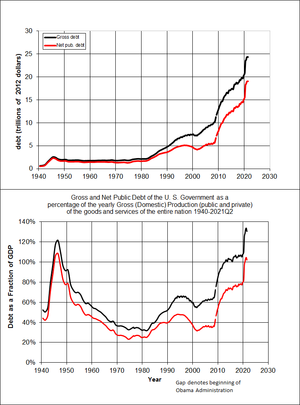. . .
Verifying this is as simple as accessing the
U.S. Treasury (see note about this link below) website where the national debt is updated daily and a history of the debt since January 1993 can be obtained. Considering the government's fiscal year ends on the last day of September each year, and considering Clinton's budget proposal in 1993 took effect in October 1993 and concluded September 1994 (FY1994), here's the national debt at the end of each year of Clinton Budgets:
[See link for chart--I won't try to re-build it here]
As can clearly be seen, in no year did the national debt go down, nor did Clinton leave President Bush with a surplus that Bush subsequently turned into a deficit.
. . . .
So why do they say he had a surplus?
As is usually the case in claims such as this, it has to do with Washington doublespeak and political smoke and mirrors.
Understanding what happened requires understanding two concepts of what makes up the national debt. The national debt is made up of public debt and intragovernmental holdings. The public debt is debt held by the public, normally including things such as treasury bills, savings bonds, and other instruments the public can purchase from the government. Intragovernmental holdings, on the other hand, is when the government borrows money from itself--mostly borrowing money from social security.
Looking at the makeup of the national debt and the claimed surpluses for the last 4 Clinton fiscal years, we have the following table:
[See link for table--I won't try to re-build it here]
Notice that while the
public debt went down in each of those four years, the
intragovernmental holdings went up each year by a far greater amount--and, in turn, the total
national debt (which is public debt + intragovernmental holdings) went up. Therein lies the discrepancy.
When it is claimed that Clinton paid down the national debt, that is patently false--as can be seen, the national debt went up every single year. What Clinton
did do was pay down the
public debt--notice that the claimed surplus is relatively close to the decrease in the public debt for those years. But he paid down the public debt by borrowing far
more money in the form of intragovernmental holdings (mostly Social Security).




